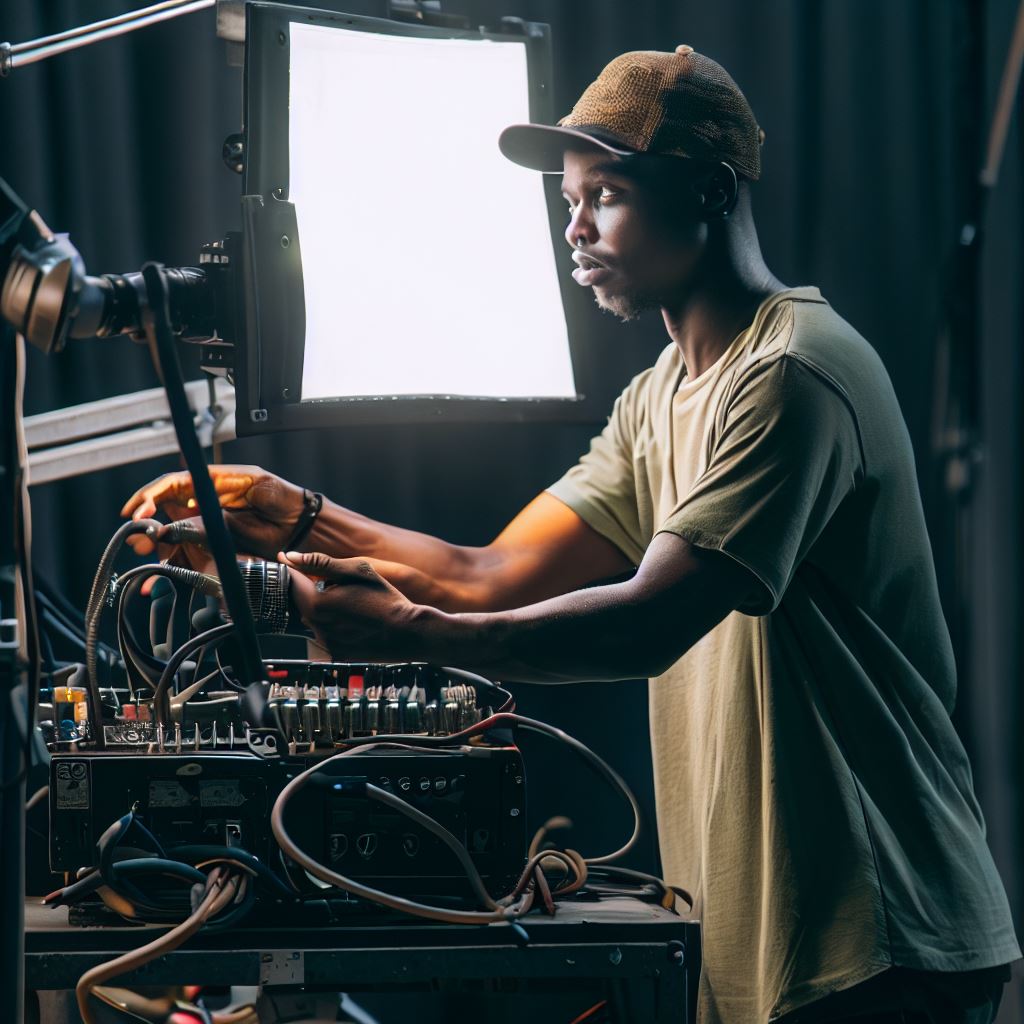Introduction
Let’s explore the path to becoming a lighting technician in Nigeria.
Lighting technicians play a crucial role in various industries, ensuring appropriate lighting for safety and aesthetics.
In the dynamic world of entertainment, events, and production, the role of a Lighting Technician stands as an indispensable cornerstone.
These skilled professionals wield the power to transform ordinary spaces into immersive realms of visual enchantment, captivating audiences and setting the stage for unforgettable experiences.
For aspiring individuals in Nigeria, the journey towards becoming a Lighting Technician is not only an exciting endeavor but also a gateway to a world of limitless creative expression and boundless opportunities.
In this comprehensive exploration, we embark on a guided odyssey through the multifaceted landscape of lighting technology, uncovering the crucial steps, essential knowledge, and practical skills that pave the way for a successful career in this specialized field.
From understanding the fundamental principles of illumination to mastering the intricacies of cutting-edge equipment, we will navigate through each vital aspect that shapes a proficient Lighting Technician.
This blog section discusses the path to becoming a lighting technician in Nigeria.
In the following sections, we will also spotlight the vibrant landscape of the entertainment and production industry in Nigeria.
By examining the evolving trends, emerging technologies, and burgeoning opportunities, we aim to provide a forward-looking perspective that equips aspiring Lighting Technicians with the insights they need to navigate this dynamic and ever-evolving sector.
This comprehensive guide is designed to be a companion, illuminating the way for passionate individuals who seek to master the art and science of lighting, and in doing so, contribute to the enchanting tapestry of Nigeria’s entertainment and production industry.
So, let us begin this enlightening journey together.
Understanding the Role of a Lighting Technician
A. Responsibilities and Duties of a Lighting Technician
- Setting up and operating lighting equipment for various events and productions.
- Collaborating with directors, designers, and other technicians to achieve the desired lighting effects.
- Maintaining and repairing lighting equipment to ensure functionality and efficiency.
- Ensuring the safety of the lighting setup and adhering to all relevant regulations.
- Creating lighting plans and designs based on the requirements of the production or event.
- Attending rehearsals and performances to make adjustments and maintain the lighting design.
- Staying updated with the latest lighting technologies and techniques through continuous learning.
B. Importance of Lighting in Different Settings
- Theater: Lighting plays a crucial role in setting the mood, emphasizing scenes, and guiding the audience’s attention.
- Film: Lighting is essential for creating the desired atmosphere, enhancing visuals, and conveying emotions.
- Events: Proper lighting can transform the ambiance, highlight key elements, and captivate the audience.
C. Skills Required to Become a Successful Lighting Technician
- Technical Expertise: Proficiency in operating lighting equipment and understanding its different components.
- Creativity: Developing innovative lighting designs that enhance the overall aesthetic and message.
- Attention to Detail: Ensuring precise and accurate placement of lights and timely cue execution.
- Collaboration: Working effectively with a team, including directors, designers, and other technicians.
- Problem-Solving: Being able to troubleshoot technical issues and find solutions promptly.
- Flexibility: Adapting to last-minute changes and improvising when faced with unforeseen circumstances.
- Organizational Skills: Managing lighting equipment inventory, schedules, and technical documentation.
- Communication: Clearly conveying lighting instructions and collaborating with colleagues.
- Physical Stamina: Enduring long hours of standing and lifting heavy equipment during setups.
Becoming a lighting technician requires a combination of technical skills, creativity, and teamwork.
Read: Salary Insights: Lighting Technicians in Nigeria Today
Education and Training Requirements for Lighting Technicians in Nigeria
A. Educational Qualifications for a Career in Lighting Technology
A high school diploma or its equivalent is the minimum educational requirement for aspiring lighting technicians in Nigeria.
Having a background in physics, mathematics, electrical engineering or a related field is advantageous.
Strong analytical skills, problem-solving abilities, and attention to detail are necessary for success in this field.
Good communication skills are also essential as lighting technicians often collaborate with other professionals in the industry.
B. Training Programs and Courses in Nigeria
Several institutions in Nigeria offer training programs and courses in lighting technology.
The National Power Training Institute of Nigeria (NAPTIN) provides training opportunities for aspiring lighting technicians.
NAPTIN offers a comprehensive curriculum that covers various aspects of lighting technology, including electrical safety and maintenance.
Other institutions like technical colleges and vocational schools also provide courses in lighting technology.
These programs equip students with the necessary technical skills and knowledge to excel in the field.
C. Benefits of Obtaining Certifications in Lighting Technology
Obtaining certifications in lighting technology can enhance career prospects and increase job opportunities.
Certifications validate the skills and knowledge acquired, ensuring credibility and professionalism.
Having certifications can also lead to higher pay and advancement opportunities within the industry.
Professionals with certifications are often preferred by employers as they demonstrate a commitment to the field.
Certifications also provide networking opportunities with other professionals in the lighting industry.
In essence, pursuing a career as a lighting technician in Nigeria requires a minimum educational qualification of a high school diploma.
However, having a background in physics, mathematics, or electrical engineering can be advantageous.
Training programs and courses offered by institutions like NAPTIN, technical colleges, and vocational schools equip individuals with the necessary skills and knowledge in lighting technology.
Obtaining certifications in this field can further enhance career prospects, increase job opportunities, and demonstrate professionalism.
As the demand for skilled lighting technicians continues to grow, aspiring professionals should consider pursuing education and training opportunities to succeed in this exciting field.
Read: Exploring the Role of Lighting Technicians in Nigeria’s Film Industry
Gaining Practical Experience as a Lighting Technician
A. Opportunities for internships or apprenticeships in Nigeria
Research companies or organizations in Nigeria that offer internships or apprenticeship programs for lighting technicians.
Contact these companies to inquire about their application process and requirements.
Submit your resume, cover letter, and any other required documents to apply for the internship or apprenticeship.
If accepted, make sure to take full advantage of the learning opportunities provided during the program.
Ask for feedback from your supervisors and mentors to improve your skills and knowledge.
Network with professionals in the industry to expand your connections and increase your chances of getting hired.
B. The importance of building a portfolio to showcase practical work
- Create a portfolio that showcases your best lighting design projects and practical work.
- Include high-quality photographs, videos, or sketches of your projects to visually demonstrate your skills.
- Write detailed descriptions of each project, explaining your role and the challenges you faced.
- Showcase a variety of projects to demonstrate your versatility as a lighting technician.
- Regularly update your portfolio with new projects and remove old ones that no longer represent your current skills.
- Share your portfolio with potential employers, clients, or collaborators to showcase your abilities.
C. Networking and volunteering opportunities in the industry
Attend industry events, conferences, or trade shows to network with professionals in the field.
Introduce yourself to lighting designers, technicians, and other industry experts.
Join professional organizations or online communities related to lighting design and technology.
Volunteer for local theater productions, concerts, or events to gain hands-on experience and expand your network.
Take part in workshops or training programs to continuously upgrade your skills and knowledge.
Stay updated with the latest trends and technologies in the lighting industry to remain competitive.
By actively seeking practical experience through internships, building a strong portfolio, and networking/volunteering, aspiring lighting technicians in Nigeria can pave their path towards success in this industry.
Read: Innovation in Nigeria: Highlighting Futuristic Architecture

Job Prospects and Salary Expectations for Lighting Technicians in Nigeria
A. Overview of the Current Job Market
The job market for lighting technicians in Nigeria is relatively competitive.
There is a growing demand for skilled lighting technicians in various sectors.
Employment opportunities are available in both urban and rural areas of the country.
Recent advancements in technology have created more job prospects for lighting technicians.
Many organizations are realizing the importance of proper lighting and are willing to hire professionals.
B. Employers and Industries
Television and film production companies require lighting technicians for their sets.
Event management companies employ lighting technicians for concerts, weddings, and other events.
Lighting equipment manufacturers often hire lighting technicians as technical support personnel.
The hospitality industry, including hotels, resorts, and restaurants, require lighting technicians.
Fashion shows, theaters, and art galleries also hire lighting technicians for their lighting needs.
C. Average Salary Range and Career Growth Opportunities
The salary range for lighting technicians in Nigeria varies depending on experience and location.
Entry-level lighting technicians earn an average monthly salary of around 50,000 to 80,000 Nigerian Naira.
Experienced professionals can earn up to 200,000 Nigerian Naira per month or more.
Career growth opportunities for lighting technicians include promotions to senior technician or managerial roles.
By gaining more experience and expertise, lighting technicians can increase their earning potential.
There is also the possibility of starting one’s own lighting company and becoming a business owner.
In brief, the job prospects for lighting technicians in Nigeria are promising, with a growing demand for skilled professionals.
Various industries, including film and television production, event management, and hospitality, require the services of lighting technicians.
The salary range for lighting technicians varies based on experience and location, with potential for significant growth with more experience and expertise.
Lighting technicians in Nigeria have career growth opportunities and the potential to start their own businesses in the field.
Read: The Future of DJing in Nigeria: Trends and Predictions
Challenges and Rewards of Being a Lighting Technician in Nigeria
A. Challenges Faced by Lighting Technicians in Nigeria
- Limited job opportunities and competition within the Nigerian lighting industry.
- Lack of proper training and certification programs for aspiring lighting technicians.
- Insufficient access to modern lighting equipment and technologies in Nigeria.
- Frequent power outages and unreliable electricity supply in the country.
- High cost of importing lighting equipment, making it difficult for technicians to acquire necessary tools.
- Limited awareness and recognition of the importance of professional lighting services in Nigeria.
- Communication and coordination challenges with clients and other professionals involved in projects.
- Health and safety risks associated with working at heights or in confined spaces during installations.
- Dealing with demanding clients and tight deadlines while maintaining quality work.
- Economic fluctuations affecting the demand for lighting services and job stability.
B. Rewards and Personal Fulfillment in the Lighting Technician Profession
- Opportunity to contribute to the artistic and creative aspects of various projects.
- Satisfaction in enhancing the ambience and atmosphere of different spaces using lighting techniques.
- Continuous learning and growth in understanding the latest lighting technologies and trends.
- Being part of a dynamic and evolving industry that allows for innovation and experimentation.
- Collaboration with other professionals, such as architects, interior designers, and event planners.
- Job flexibility with the possibility of freelancing or starting a lighting business.
- Competitive salary prospects and the potential for career advancement with experience.
- The ability to positively impact events, productions, and performances through effective lighting.
- Meeting and working with diverse clients and building professional relationships.
- The pride and sense of achievement in successfully executing lighting designs and installations.
C. Success Stories and Testimonials from Nigerian Lighting Technicians
- Mr. Tunde Adekunle, a renowned lighting technician, shares how he transformed wedding venues with customized lighting designs.
- Mrs. Ngozi Okonjo, a professional lighting technician, explains how she illuminated theaters to elevate live performances in Nigeria.
- Mr. Ibrahim Ahmed, a successful lighting technician, describes how he successfully executed a lighting project for a high-profile corporate event.
- Testimonial from a client who praises the exceptional skills and creativity demonstrated by a Nigerian lighting technician.
- Success story of a lighting technician who started his own lighting company and now supports local talents in the industry.
In review, while the lighting technician profession in Nigeria may face challenges, including limited job opportunities and access to modern equipment, the rewards and personal fulfillment it offers make it a worthwhile career choice.
Through their creativity and expertise, lighting technicians contribute to enhancing various spaces and events, positively impacting the overall experience for both clients and audiences alike.
Conclusion
This blog post highlighted the path to becoming a lighting technician in Nigeria, including the necessary skills and qualifications.
Aspiring lighting technicians in Nigeria should pursue their passion, as the field offers promising opportunities for growth and success.
For further information or support, aspiring lighting technicians can refer to professional associations, vocational training centers, and online resources available in Nigeria.




